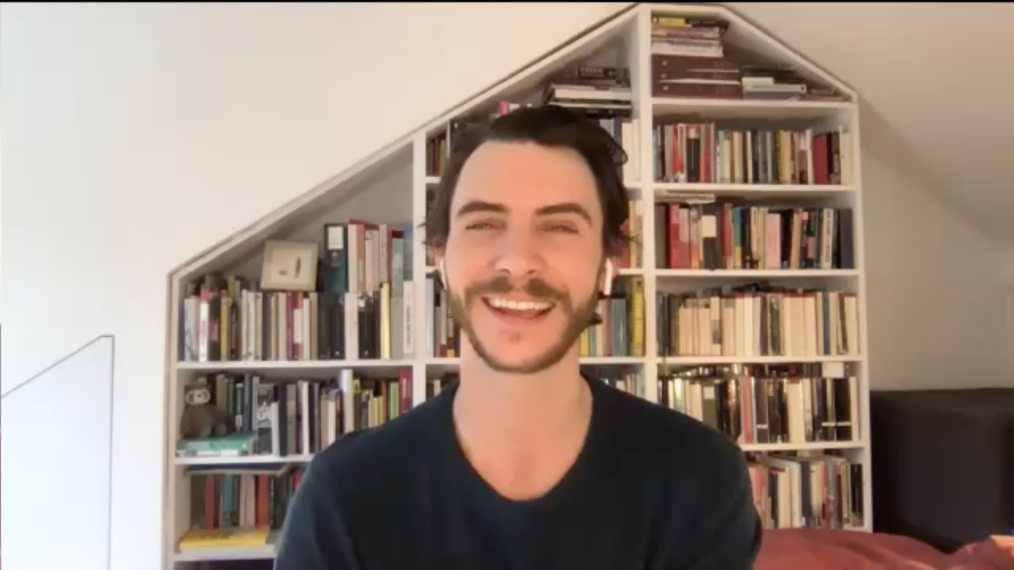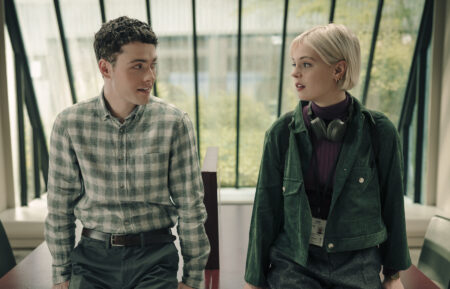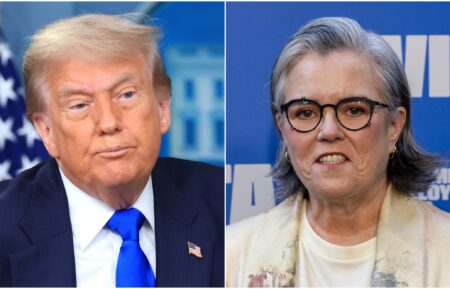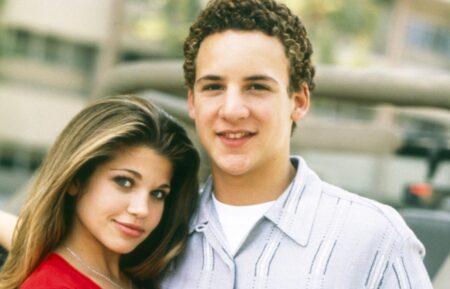‘Brave New World’ Has a Major Drug Problem in Episode 4 (RECAP)
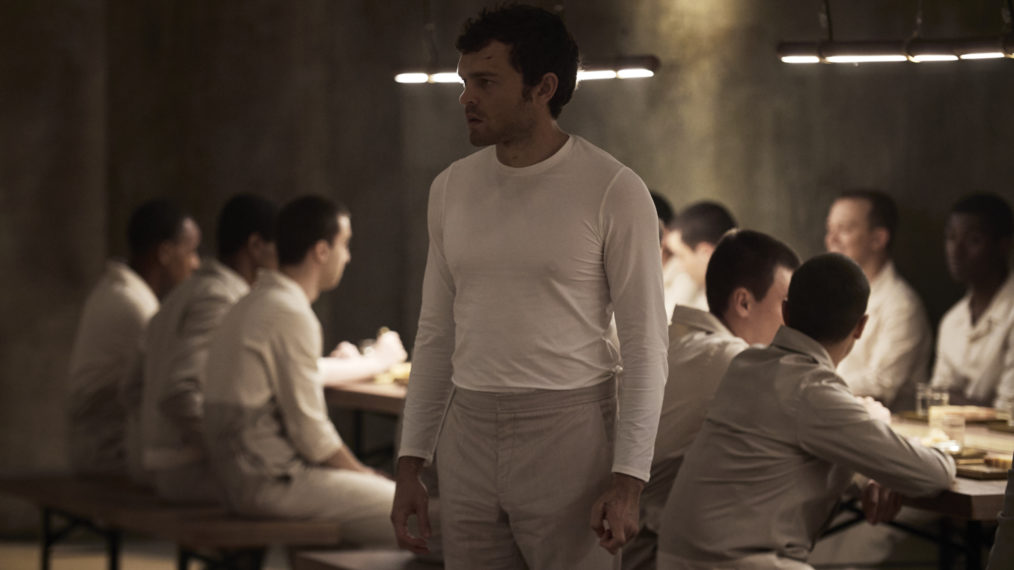
Spoiler Alert
[Spoiler Alert: This recap contains spoilers from Brave New World Season 1 Episode 4, “Swallow”]
One of the things Brave New World has translated well from the original novel is the subject of over-medication, specifically the debilitating effects of drug dependency. Aldous Huxley created a futuristic world populated by pill-popping prescription abusers—a different color tablet depending on which emotion the user wants to subdue. It grimly foreshadows an anxiety-stricken modern world, where mood-altering sedatives like Xanax and Valium can quickly become unhealthy addictions if not taken in moderation.
In New London, if you feel down or upset, you simply pop a pill and distract yourself with indulgences, whether that be new tech or the latest feely blockbuster. As an anxiety-sufferer whose common coping mechanism is getting lost down the YouTube rabbit hole, I can relate to this notion of “therapy-by-distraction.” But it’s not always the healthiest option. Yes, a mind-numbing distraction and a prescribed sedative can help take the edge off, but it’s not a cure-all fix. One also needs to confront their issues and talk about them; only then can you truly learn and grow. But nobody talks about their problems in the World State because, well, there are meant to be no problems.
The citizens of New London knock back soma pills like candy from a Pez dispenser. Their entire society is built on the premise of 24/7 happiness. Any emotion on the wrong side of blissful ignorance is not tolerated. You do not talk about your feelings. To dwell in sadness or loneliness is an alien concept to these people, just look at their baffled reactions to John’s (Alden Ehrenreich) grief. They gawk at him through the glass as he sits and prays by his mother’s body, observing his movements as if he’s a freakish zoo animal. “It’s common for them to watch pointlessly over the dead,” Mustafa Mond (Nina Sosanya) explains to the concerned Director (Ed Stoppard).
It’s not John’s grief that worries the Director, though, it’s what his presence means for the World State’s social body. “Their conditioning makes them impulsive, erratic, dangerous,” he warns Mustafa, suggesting he should be the one to help the savage integrate. However, that is a job for Bernard (Harry Lloyd), a card-carrying advocate for soma. “At moments like this, John,” Bernard says, “it’s very hard to know what color soma to… green, I think.” The weasely bureaucrat is gloriously dickish here, even when he doesn’t intend to be. “Though it is a shameful thing to be a mother or a father, well, it’s intolerable, no one blames you,” he tells John as if that is in any way comforting.
On the other hand, Lenina (Jessica Brown Findlay) is trying to ween herself off the soma. She is changed after her visit to the Savage Lands and doesn’t want to numb her new feelings with drugs. By all accounts, you would say that Lenina is depressed. She spends most of her days in bed, disconnected from her usual Beta Plus routines of work-play-sex. When Frannie (Kylie Bunbury) tries to soma her up, Lenina slaps her best friend’s hand away, just as John does to Bernard when offered a pill. Lenina apologizes, but Frannie acts as if nothing happened; she swallows her soma and carries on because acknowledging the indiscretion would mean questioning their conditioning… and their reality.
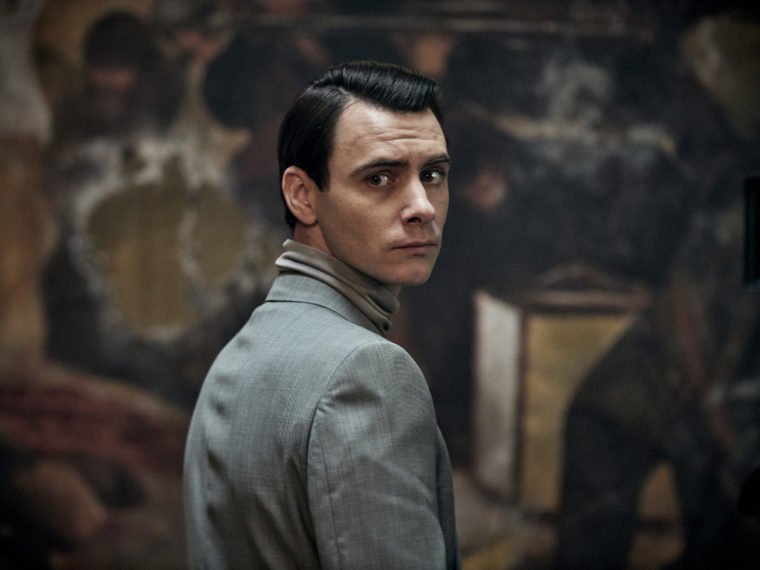
NBC Peacock
Lenina is so distracted she makes mistakes at work, forgetting to designate a cell to its correct caste. It’s hard to focus when her mind has been opened up to a new world of possibilities. She has been introduced to concepts like motherhood and marriage and… Neil Young. But when she talks to Bernard, the one person who should be able to understand what she’s going through, he waves her off with the whole soma spiel. “Just don’t think about it,” he tells her. “All I do is think about it,” she replies, “and I want to think about it.” Unlike Bernard, Lenina doesn’t want to ignore her feelings. She has developed an empathy for John, for his people, and gained an insight into another way of life. “His mother died, and that matters,” she says, before quickly adding the qualifier, “to them.”
The thing is, Bernard knows where Lenina is coming from, as he, too, is different. He’s prone to anger and jealousy and feelings of loneliness. But he’d rather hide his emotions from himself and others than readily admit to this. Bernard doesn’t want to go against the World State, though he does want a more important role within it. He seizes any chance for attention. Just look at the way he brags about his “heroic efforts” to drive an “autocar” in the Savage Lands, entirely unaware people are mocking him behind his back. That’s why he relishes the opportunity to act as John’s guardian, not only does it give him authority, but it also brings an air of celebrity and intrigue.
“Eventually, you will learn to think like we do,” Bernard tells John, who refuses to speak or indulge in the new world customs. “You don’t need to be unhappy.” But Bernard is in over his head, losing track of John after leaving him with an equally inept colleague. John escapes through this strange new city, shuffling past the glaring citizens and their curious whispers. He doesn’t belong amongst these smiling drugged-up robots with their beige dress wear and nightly sex parties. However, he does share a fleeting connection with the Epsilon workforce, including the mysterious CJack60 (Joseph Morgan), who offers John his food.
The shocking development, though, is that John belongs in New London more than one might think. His profile already exists on the system, and what’s more, he’s categorized as an Alpha (an Alpha Exotic to be precise, which I think means he can own a tiger sanctuary). This is an absurd notion to Bernard, who refuses to see how a savage could be an Alpha—that’s until he finds a match between John’s optic interface and that of the Director. It turns out, John’s mother was telling the truth. John’s father was an Alpha Plus, the former Director of the Savage Lands, and therefore, this is John’s home just as much as anyone’s. Bernard is giddy that he has dirt on his boss, who, to be fair, treats Bernard like a real Epsilon.
But Bernard doesn’t get a chance to gloat as our Director soon goes the way of Linda. After attempting to sneak John out of the city and onto a rocket ship back to the Savage Lands, the Director tries to frame it as if he’s helping his son. “They’ll feed you pills until you can’t remember who you are and put you on display,” he claims. There is perhaps some truth to this, but the Director also has his own selfish reasons for this defiant act. And John sees it. This man is his father, the man who abandoned him and his mother in the Savage Lands. He’s not helping John out the kindness of his heart; he’s trying to remove his shame before others find out.
“We didn’t know what was happening, how could we know?” the Director says as he explains how Linda fell pregnant. “There are no mothers here, no fathers, no sons.” The fact the Director and Linda were monogamous is yet another sign that conditioning is not a flawless system. New London’s inhabitants still have “old ways” of thinking and behaving when they’re not being spied on or dosed up on soma. But, much like Bernard, the Director chose the social body over his own feelings, and he doesn’t want to lose his position in the hierarchy. But John refuses to go; he knows he’ll be killed if he returns to the Savage Lands. And so he fights with his dad on the edge of a cliff and, to the surprise of no one, the Director plummets to his shonky CGI death.
All out of options, John returns to the city and wanders into the latest “feely.” He’s caressed by the sex-crazed citizens, who descend on him like a herd of sexy naked zombies. Lost and afraid, he clambers a metal tower structure in the middle of the dance floor, screaming and batting folk away like King Kong atop the Empire State Building. At this moment, John is desperate for a familiar face, and who should show up to save the day? It’s Bernard. This time, John accepts Bernard’s help, taking his hand as he’s rushed to the safety of his mother’s resting place. According to Mustafa, all of this stress and chaos is a test from Indra, a destabilizing element introduced to help make the society stronger.
It’s kind of a tragic irony that John ends up on the soma prescription at the end of the episode. “I don’t want you to feel like this, John,” says Benard, for a second, almost sounding like he cares. “I’m going to help you.” This time, John reluctantly takes the pill. At the same time, Lenina, too, reverts to life before the Savage Lands… before she felt so much. She strides into Henry Foster’s (Sen Mitsuji) apartment, strips naked, and tells him to “be the same as before… and I’ll be the same.” No problems, just sex and soma.
You can’t help but feel these are temporary fixes, however, a Band-Aid masking a permanent scar. There is an unavoidable change going on in New London, and everyone is doing their damndest to ignore it or subdue it. But distractions don’t last forever, and soma is no miracle cure, so it’s only a matter of time before these feelings rise back to the surface and demand to be confronted.
Brave New World, Now Streaming, Peacock

